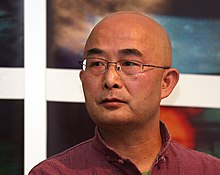
Facebook has suspended the account of the exiled Chinese author Liao Yiwu, writes journalist Ian Johnson in the New York Times. Not or the first time, the censorship of the internet giant hits the wrong person. Liao opposes the move: “I didn’t knuckle under the Communist Party, and I won’t knuckle under Facebook.”
Ian Johnson:
On Tuesday, the exiled writer, Liao Yiwu, said that he had received a notice from Facebook stating that his account had been temporarily suspended, and that it would be blocked permanently if he continued to violate the site’s rules against nudity.
The move follows Facebook’s decision last week to delete a picture of the self-immolation of a Buddhist monk that had been posted by the Tibetan writer Woeser…
Facebook officials say that all of this is irrelevant to the case involving Mr. Liao, who lives in exile in Germany.
“Facebook has a pretty simple policy with regard to nudity: We prohibit it,” the company said in a statement. “The individual in question repeatedly posted pictures containing nudity. As a result, consistent with our existing policies and standard operating procedure, we removed the pictures and temporarily blocked the account. Any suggestion that we took action because of politics, philosophy or theoretical business interests is complete nonsense.”
Mr. Liao said the case was not that simple. In an interview at his home in Berlin, the 56-year-old writer said he had covered up the genitalia of the streaker in the photo after people pointed out that it might violate Facebook rules. He cut out a picture of the former Chinese leader Mao Zedong and pasted it over the man’s groin in the photo. His account was suspended several days after doing so.
“They said I’d have to change my ways or I’d never post again on Facebook,” Mr. Liao said. “But I didn’t knuckle under the Communist Party, and I won’t knuckle under Facebook.”
The protester in the picture was at a demonstration that is an annual occurrence led by the dissident artist Meng Huang in support of Mr. Liao’s friend, the Nobel Peace Prize laureate Liu Xiaobo. In December 2012, Mr. Liao and Mr. Meng went streaking in Stockholm on the anniversary of the prize ceremony for Mr. Liu, whose absence had been marked by an empty chair. In 2013 and 2014, Mr. Meng streaked alone in Stockholm, but Mr. Liao posted pictures of the events.
Whereas Russia has made direct requests to Facebook to block the pages of protesters and critics, the move against Mr. Liao is unlikely to be the result of a demand by the Chinese government. According to a report on censorship requests from governments that Facebook issued in 2014, the company received no appeals from China in 2013.
Instead, Mr. Liao and others said they believed that Internet trolls on the government payroll — known as the 50-Cent Party for the money they receive for each pro-government comment or post they make — were behind the complaint.
Such tactics are also common in Vietnam, where so-called opinion shapers report online posts by critics of the government, prompting the shutdown of the critics’ pages.
The situation is problematic for Facebook, because it will most likely never be able to satisfy Chinese censors, said Emily Parker, a New York-based writer and the author of “Now I Know Who My Comrades Are: Voices From the Internet Underground,” a book on Internet activism.
“China is a really attractive market, and companies like Facebook would love to get in,” Ms. Parker said in a telephone interview. “But there would be a huge P. R. backlash if they decided to play by Chinese censorship rules.”
“And even if they did play by those rules, they still might not succeed in China,” she continued. “They would likely have to compete with local players who were more trusted by Chinese authorities.”

Ian Johnson is a speaker at the China Speakers Bureau. Do you need him at your meeting or conference? Do get in touch or fill in our speakers´request form.
Are you interested in more media experts at the China Speakers Bureau? Do check out this recent list.




